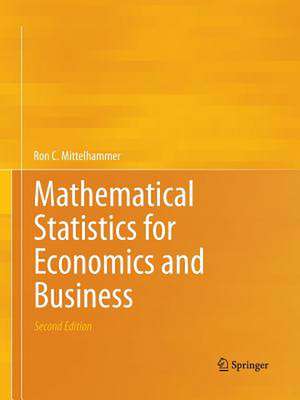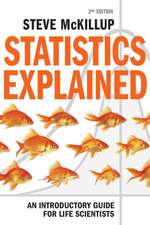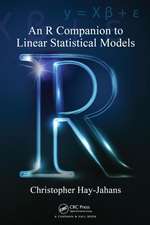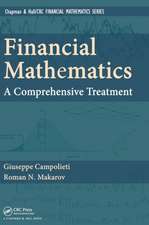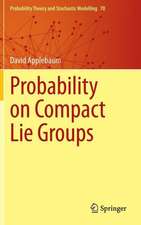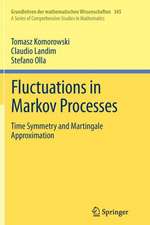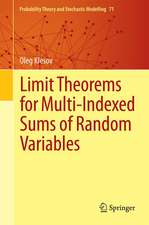Mathematical Statistics for Economics and Business
Autor Ron C. Mittelhammeren Limba Engleză Paperback – 2 apr 2015
After introducing the concepts of probability, random variables, and probability density functions, the author develops the key concepts of mathematical statistics, most notably: expectation, sampling, asymptotics, and the main families of distributions. The latter half of the book is then devoted to the theories of estimation and hypothesis testing withassociated examples and problems that indicate their wide applicability in economics and business. Features of the new edition include: a reorganization of topic flow and presentation to facilitate reading and understanding; inclusion of additional topics of relevance to statistics and econometric applications; a more streamlined and simple-to-understand notation for multiple integration and multiple summation over general sets or vector arguments; updated examples; new end-of-chapter problems; a solution manual for students; a comprehensive answer manual for instructors; and a theorem and definition map.
This book has evolved from numerous graduate courses in mathematical statistics and econometrics taught by the author, and will be ideal for students beginning graduate study as well as for advanced undergraduates.
| Toate formatele și edițiile | Preț | Express |
|---|---|---|
| Paperback (1) | 631.52 lei 6-8 săpt. | |
| Springer – 2 apr 2015 | 631.52 lei 6-8 săpt. | |
| Hardback (1) | 834.47 lei 6-8 săpt. | |
| Springer – 6 mar 2013 | 834.47 lei 6-8 săpt. |
Preț: 631.52 lei
Preț vechi: 742.97 lei
-15% Nou
120.84€ • 131.67$ • 101.83£
Carte tipărită la comandă
Livrare economică 23 aprilie-07 mai
Specificații
ISBN-10: 1489989501
Pagini: 788
Ilustrații: XXIX, 755 p.
Dimensiuni: 210 x 279 x 45 mm
Greutate: 1.74 kg
Ediția:2nd ed. 2013
Editura: Springer
Colecția Springer
Locul publicării:New York, NY, United States
Public țintă
GraduateCuprins
Notă biografică
Textul de pe ultima copertă
After introducing the concepts of probability, random variables, and probability density functions, the author develops the key concepts of mathematical statistics, most notably: expectation, sampling, asymptotics, and the main families of distributions. The latter half of the book is then devoted to the theories of estimation and hypothesis testing withassociated examples and problems that indicate their wide applicability in economics and business. Features of the new edition include: a reorganization of topic flow and presentation to facilitate reading and understanding; inclusion of additional topics of relevance to statistics and econometric applications; a more streamlined and simple-to-understand notation for multiple integration and multiple summation over general sets or vector arguments; updated examples; new end-of-chapter problems; a solution manual for students; a comprehensive answer manual for instructors; and a theorem and definition map.
This book has evolved from numerous graduate courses in mathematical statistics and econometrics taught by the author, and will be ideal for students beginning graduate study as well as for advanced undergraduates.
Caracteristici
Descriere
Mathematical Statistics for Economics and Business, Second Edition, provides a comprehensive introduction to the principles of mathematical statistics which underpin statistical analyses in the fields of economics, business, and econometrics. The selection of topics in this textbook is designed to provide students with a conceptual foundation that will facilitate a substantial understanding of statistical applications in these subjects. This new edition has been updated throughout and now also includes a downloadable Student Answer Manual containing detailed solutions to half of the over 300 end-of-chapter problems.
After introducing the concepts of probability, random variables, and probability density functions, the author develops the key concepts of mathematical statistics, most notably: expectation, sampling, asymptotics, and the main families of distributions. The latter half of the book is then devoted to the theories of estimation and hypothesis testing with associated examples and problems that indicate their wide applicability in economics and business. Features of the new edition include: a reorganization of topic flow and presentation to facilitate reading and understanding; inclusion of additional topics of relevance to statistics and econometric applications; a more streamlined and simple-to-understand notation for multiple integration and multiple summation over general sets or vector arguments; updated examples; new end-of-chapter problems; a solution manual for students; a comprehensive answer manual for instructors; and a theorem and definition map.
This book has evolved from numerous graduate courses in mathematical statistics and econometrics taught by the author, and will be ideal for students beginning graduate study as well as for advanced undergraduates.
